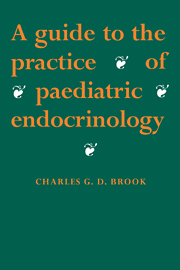9 - The endocrine consequences of neoplasia
Published online by Cambridge University Press: 09 October 2009
Summary
Hormone-secreting tumours are not common in children but tumours, particularly intracranial neoplasms, have effects on the endocrine system in general and the hypothalamo-pituitary axis in particular. Treatment with surgery, chemotherapy and radiotherapy has extensive consequences on the endocrine system.
Primary disorders
Leukemia is the commonest malignant disease in children. It rarely affects hormone secretion but its treatment frequently does so (see below). Intracranial space occupying lesions come second with an annual incidence of 2.2–2.5 brain tumours per 100 000 children; supratentorial tumours are commoner in children under the age of 4 years and in adults but, in the age-group 4–11 years, infratentorial tumours outnumber supratentorial by 3 to 1.
Tumours in the posterior fossa (50%), lateral ventricles and cerebral hemispheres (30%) usually present with symptoms of raised intracranial pressure or a neurological complaint (e.g.epilepsy) and rarely with endocrine disorders. However, children with brain tumours in any situation grow badly and a diminution of growth velocity is often the first sign of tumour relapse, so whenever growth assessment reveals a problem, the possibility of a brain tumour distant from the hypothalamo-pituitary axis should be considered. Gonadotrophin-dependent (central) precocious puberty may be a consequence of simple hydrocephalus so any tumour may present in this way.
Tumours of the optic nerve, pituitary, pineal or hypothalamus, which comprise 20% of childhood intracranial neoplasms, may have direct endocrine effects on growth, usually inhibiting it, on pubertal development, causing it to be either early or late, or on thirst and appetite.
- Type
- Chapter
- Information
- A Guide to the Practice of Paediatric Endocrinology , pp. 151 - 157Publisher: Cambridge University PressPrint publication year: 1993



